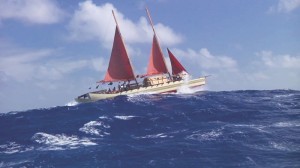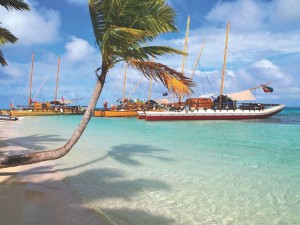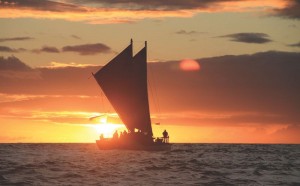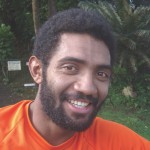Across the Pacific, the voyaging canoe is said to represent genealogy. Pacific Islanders trace their origins to certain canoes, for each is a sacred and living treasure that connects people to their ancestry. The canoe is origin and possibility, heritage and story, and a poetic, powerful metaphor of planet Earth, reminding us that we are an island of finite resources, floating in the sea of space.
As she voyages, the canoe embodies balance, harmony, teamwork, and respect. If one of her hulls is damaged, we take actions to repair it and prevent sinking. So too is our responsibility for the Earth, to care for our home as though the planet is on loan to us from future generations yet to be born…
As the largest of Earth’s living systems, the ocean is our breath, our very survival, and yet we are witnessing the rapid decline of a once healthy ecosystem. Both modern and Indigenous science alert us to the visible issues of over-fishing, sea level rise and marine debris, including the abundance of plastics in the sea. Yet the ocean also harbors the more hidden threats of noise pollution, expanding dead zones, and ocean acidification. To translate this knowledge of an imperilled ocean into an initiative for change, we engage the heart.
It is often through storytelling that we evoke emotion, stir inspiration and empower change. By drawing on the stories of our past and by perpetuating our heritage we shape the possibilities of our future. We create a new narrative, a new sail plan for Island Earth, drawing on the ancient island wisdom of sustainability to guide us. Our ancestors lived in a reciprocal relationship with nature. Their model of interconnectedness of life on small islands is more valuable today than ever before.
Searching for the best way to convey the urgent message of marine protection, Dieter Paulmann, with his foundation Okeanos for the Sea, was inspired by Pacific Island culture and our stories of voyaging. He found strength in the Pacific people, a cultural heritage and value system that serve as an inspiring model. As an oceanic people, Pacific Islanders have a history of navigating without instruments across vast distances to discover far-flung islands. We sailed by acute observation, educated intuition and intricate observation of the stars, sun, moon, wildlife and ocean swells. This art is being revived, with voyaging canoes and Pacific voyagers serving as powerful messengers to raise awareness of our imperiled oceans.
The Pacific Ocean is larger than all of Earth’s land masses combined. The first explorers of this vast expanse relied upon universal traits of the human spirit; the courage, curiosity and sense of vision that continually urges us to always be learning, exploring and discovering. Their great migration began by setting sail from Southeast Asia and Taiwan to the East. Thousands of years later and, in an extraordinary feat of ocean exploration, our ancestors ventured into the farthest reaches of the Pacific Ocean; a vast expanse nearly twice the size of the United States, spanning from Rapanui (Easter Island) in the east to Aotearoa (New Zealand) in the southwest and Hawaii in the north. These ancient seafarers traveled on double-hulled voyaging canoes for thousands of miles, carrying everything they would need, from root crops and seeds to domestic animals, to thrive in a new land.
The amazing journey of seven vaka moanas, or ocean going canoes, sailing across the Pacific, fueled by the wind and sun began, supported by the Okeanos Foundation for the Sea. The vaka, were crewed by Indigenous people of many Pacific nations, sailing as one, reconnecting with cultural heritage and raising awareness about contemporary threats to the ocean.
Today they continue to voyage, recognizing the Earth as a planet of finite resources and our only home. The vaka is a microcosm of our Pacific Islands, but also of our larger island that is planet Earth. It is a window in time, connecting us with our mana – our spirit – of collective consciousness, ancient knowledge, harmony and teamwork. Bridging ancestral wisdom and renewable energy, the vaka tells a universal story of hope.
The Uto Ni Yalo
The Fijian canoe is named Uto Ni Yalo, which quite literally translates to ‘Heart of Spirit.’
Is the Uto Ni Yalo a Fijian Drua? It is not if you are talking about its design. The Uto Ni Yalo is a fusion of traditional central Pacific canoe design, utilizing modern boat-building materials and technologies. Together with the other six other canoes, the Uto Ni Yalo was built with the generous support of Okeanos in Auckland at Salthouse Boatbuilders. These newly designed sailing canoes vaka moana [Pacific]/ waka hourua [Maori]) are all constructed of e-glass and foam, using advanced infusion processes. Nevertheless, traditional ingenuity and knowledge remain clearly visible with the twin hulls cunningly connected by wooden beams and lashed only with rope. Each vaka is finished with intricate traditional designs, and carved and painted using colours and insignia representative of each nation.
Much effort and detail has gone into creating a truly eco-friendly vaka that harnesses only wind and current to travel. To aid maneuvering in tight modern berthing stations, or to assist in harbor entries, a solar powered system serves as an auxiliary propulsion option. This merging of past and present ideas serves as a useful metaphor for solutions to our planet’s energy and climate change issues.
Island of Hope
We, as Pacific Voyagers, are on a journey, sailing to an island in the future and navigating by the values of our ancestral past. Our ancestors understood that the health of the oceans reflects the health of the people. When we truly acknowledge this insight, when we are aware of the extensive threats to the ocean, and when we care about the future of our children, the only logical step is to create a new vision, a sustainable sail plan based on values of interconnectedness, respect and stewardship.
Island of Hope is a vision for the future where the Pacific is the first fossil fuel-free continent on Earth.
The goal is to protect the ocean by preventing activities that contribute to sea level rise, ocean acidification, warming oceans, over-fishing and reef destruction. We also seek to preserve tradition for children including myth and story; the values of cooperation and caring; and the old traditions of voyaging, fish farming, canoe building, craftsmanship, art and wisdom about the sea. Three projects – our family of vakas (Moana, Motu and Hapua), OFEC (Organization of Fish-Exporting Countries), and Fossil Fuel Free Islands – together make the Island of Hope.
We are storytellers, and it is through stories that we can transform understanding from the head to action by the hands, via pathways of the heart. Using celestial voyaging as a metaphor, the head, heart and hands are three stars that we will use to steer and orient us in maintaining our course towards a sustainable future for our Island Earth.
Ancient legend tells the story of the demi-god Maui using his fishhook to metaphorically pull the islands from the sea. Today, it is through the merging of tradition and modern alternative energy by empowered and selfreliant communities, that we will navigate towards a sustainable future and, together, bring the Island of Hope to appear on the horizon.
Source: www.pacificvoyagers.com | www.fijivoyaging.com
Seru Saumakidonuoroitoka hails from the village of Raviravi, Kubulau, in the province of Bua. Like many others in the more remote parts of Fiji, never in his wildest dreams did Seru imagine that he would sail on a vessel like the Uto ni Yalo – this fine traditional canoe he had only seen on national television and in the newspapers.
When the Uto ni Yalo pulled up onto his home village in Kubulau back in 2010 Seru, saw his chance to join the crew, a privilege that was simply too much not to grasp hold of. As a keen member of the Kubulau Resource Management Committee, Seru seized the opportunity to learn and experience new things about the environment onboard the Uto ni Yalo. A week later and after some negotiation with his family, Seru was part of a wider training group preparing for the voyage.




judy coulter says
Truly inspiring, an alternative from todays destruction of the environment. We ARE ALL connected.